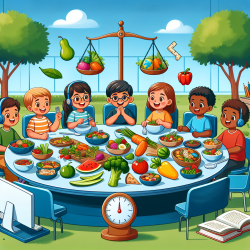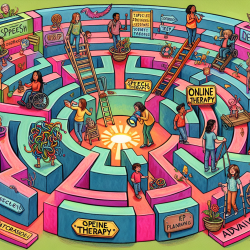Introduction
In the evolving landscape of education, integrating environmental sustainability into the curriculum is becoming increasingly vital. The recent study titled Children’s Perceptions about Environmental Sustainability, Food, and Nutrition in Chile: A Qualitative Study provides insightful findings that can guide educators and practitioners in shaping the next generation's understanding of sustainability, particularly through food choices. This blog explores the implications of the study and offers practical steps for educators to enhance their teaching strategies.
Understanding Children's Perceptions
The study, conducted with Chilean schoolchildren aged 8-9, revealed that while most children are not initially familiar with terms like "environmental sustainability" or "carbon footprint," they can grasp these concepts when explained in simple terms. The children showed a positive perception of eco-labels and recognized the environmental impact of their eating behaviors. This highlights the potential for educators to foster environmental awareness by simplifying complex ideas and using relatable language.
Practical Steps for Educators
- Incorporate Age-Appropriate Language: Use terms like "helping the planet" or "taking care of the Earth" to explain sustainability concepts. This can make abstract ideas more tangible for young learners.
- Utilize Visual Aids: Introduce eco-labels and visual cues in lessons to help children associate sustainable practices with everyday actions. This can be integrated into activities such as drawing or crafting.
- Engage in Interactive Learning: Conduct activities that involve decision-making, such as choosing between different snack options based on their environmental impact. This encourages children to think critically about their choices.
- Promote Discussions: Facilitate group discussions on topics like recycling, reducing waste, and conserving resources. Encourage students to share their thoughts and ideas on how they can contribute to sustainability.
Encouraging Further Research
The study underscores the need for further research into how children understand and apply sustainability concepts in their daily lives. Educators and practitioners are encouraged to explore innovative methods to integrate sustainability education into their programs. By collaborating with researchers, schools can develop tailored curricula that address the unique needs and understanding levels of their students.
Conclusion
Empowering children with knowledge about environmental sustainability through food choices is a crucial step in nurturing responsible future citizens. By implementing the findings of the Chilean study, educators can inspire students to make informed decisions that benefit both their health and the planet. As we continue to explore and refine our teaching strategies, we pave the way for a more sustainable future.
To read the original research paper, please follow this link: Children’s Perceptions about Environmental Sustainability, Food, and Nutrition in Chile: A Qualitative Study.










